Text
Unlocking the Power of Data: Exploring the World of Data Science and its Boundless Career Opportunities
In today's digital age, data has become the new currency driving innovation, efficiency, and growth across industries. From e-commerce giants analyzing consumer behavior to healthcare providers optimizing patient care, the ability to extract insights from data has never been more crucial. At the heart of this data revolution lies the field of data science, a multidisciplinary blend of statistics, computer science, and domain knowledge aimed at uncovering actionable insights from complex datasets.
It involves the use of techniques such as data mining, machine learning, and predictive analytics to solve complex problems and make informed decisions. Enhancing your career at the Data Science Course in Coimbatore entails taking a systematic strategy and looking into enrolling in a suitable course that will greatly expand your learning journey while harmonizing with your preferences.
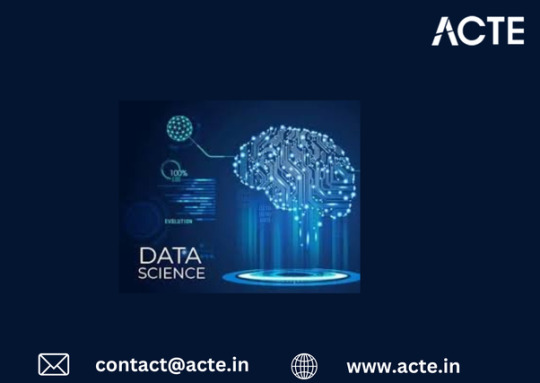
Key aspects of a career in data science and its scope:
High Demand: There is a high demand for skilled data scientists across various industries such as finance, healthcare, retail, marketing, technology, and more. As companies continue to generate vast amounts of data, the need for professionals who can analyze this data and derive actionable insights is expected to grow.
Diverse Job Roles: Data science offers a diverse range of job roles, including data analysts, data engineers, machine learning engineers, data scientists, and more. These roles may involve tasks such as data cleaning, exploratory data analysis, statistical modeling, machine learning, and the development of data-driven applications.
Lucrative Salaries: Data science is known for offering competitive salaries due to the high demand for skilled professionals. Salaries can vary depending on factors such as experience, location, industry, and job role, but data scientists typically command above-average salaries compared to many other professions.
Continuous Learning: Data science is a dynamic field that is constantly evolving with new techniques, tools, and technologies. Professionals in this field need to continuously update their skills and knowledge to stay relevant. This presents opportunities for continuous learning and professional growth through online courses, certifications, workshops, and conferences.
Impactful Work: Data science enables professionals to have a significant impact on business outcomes by leveraging data to solve complex problems, optimize processes, improve decision-making, and drive innovation. This aspect of the field can be highly rewarding for individuals who are passionate about making a difference through their work. For those who want to thrive in Data Science, Data Science Online Training is highly suggested. Look for classes that align with your preferred programming language and learning approach.
Interdisciplinary Nature: Data science involves interdisciplinary collaboration, requiring professionals to have a strong foundation in areas such as mathematics, statistics, computer science, and domain expertise relevant to the industry they work in. This interdisciplinary nature creates opportunities for individuals from diverse educational backgrounds to pursue a career in data science.
Global Opportunities: The demand for data scientists is not limited by geographic boundaries, with opportunities available in various countries around the world. This global demand allows professionals to explore career opportunities internationally and work with diverse teams on challenging projects.
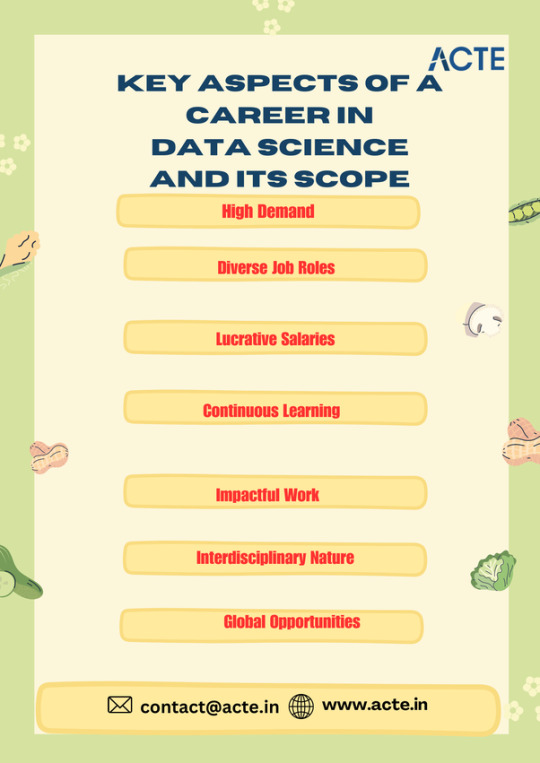
The future of Data Science looks promising as more organizations embrace data-driven decision-making. The demand for skilled Data Scientists is expected to continue growing exponentially in the coming years.
In conclusion, data science is a dynamic and rapidly evolving field with immense potential for growth and innovation. As organizations continue to invest in data-driven technologies, the demand for skilled data professionals will only increase. Whether you're a recent graduate looking to enter the field or an experienced professional seeking new opportunities, embarking on a career in data science can open doors to a world of possibilities. So, if you're passionate about unlocking the power of data and making a meaningful impact, consider exploring the exciting realm of data science today.
0 notes
Text
Navigating the World of Data Science: A Beginner's Guide
In today's digital age, data is everywhere, and its value is undeniable. From influencing business decisions to shaping public policy, data drives much of what we do. With the increasing reliance on data, the field of data science has emerged as one of the most sought-after and rewarding career paths. However, navigating the vast and complex world of data science can be daunting for beginners. In this beginner's guide, we'll explore what data science is, why it matters, and how you can embark on your journey in this exciting field.
If you're interested in pursuing a career in data science, there are several key things you need to knowEnhancing your career at the Data Science Course in Coimbatore entails taking a systematic strategy and looking into enrolling in a suitable course that will greatly expand your learning journey while harmonizing with your preferences.

Essential Skills for Becoming a Data Scientist
1. Programming Languages
Python: Learn Python programming language, which is widely used in data science for its simplicity and versatility.
R: Familiarize yourself with R programming language, commonly used for statistical analysis and data visualization.
2. Statistics and Mathematics
Probability and Statistics: Understand fundamental concepts of probability theory, statistical inference, and hypothesis testing.
Linear Algebra: Gain proficiency in linear algebra, particularly matrices and vectors, which are essential for machine learning algorithms.
3. Data Wrangling and Cleaning
Data Manipulation: Learn techniques for data wrangling and cleaning, including handling missing values, data normalization, and data transformation.
Data Visualization: Master data visualization libraries like Matplotlib and Seaborn to communicate insights effectively.
4. Machine Learning
Supervised Learning: Understand algorithms for supervised learning tasks such as regression and classification.
Unsupervised Learning: Learn about clustering and dimensionality reduction techniques used in unsupervised learning.
5. Big Data Technologies
SQL: Acquire knowledge of SQL for querying databases and extracting relevant data.
Hadoop and Spark: Familiarize yourself with big data processing frameworks like Hadoop and Spark for handling large datasets.
6. Domain Knowledge
Industry Expertise: Gain domain-specific knowledge in areas like healthcare, finance, or e-commerce to apply data science techniques effectively.
Business Acumen: Understand business objectives and how data science can contribute to solving real-world problems.For those who want to thrive in Data Science, Data Science Online Training is highly suggested. Look for classes that align with your preferred programming language and learning approach
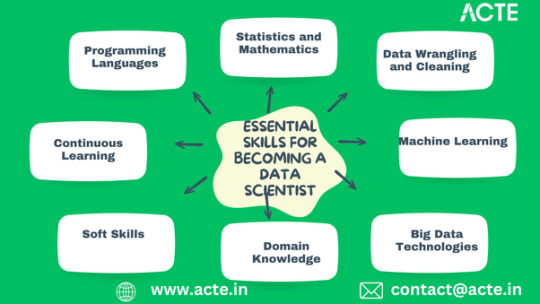
7. Soft Skills
Communication: Develop strong communication skills to convey complex findings to non-technical stakeholders.
Problem-Solving: Cultivate critical thinking and problem-solving skills to tackle diverse data science challenges.
8. Continuous Learning
Stay Updated: Keep abreast of the latest developments in data science by reading research papers, attending conferences, and participating in online courses.
Practice: Continuously practice and apply your skills through projects, competitions, and real-world applications.
Data science offers exciting opportunities for individuals passionate about exploring and analyzing data to derive actionable insights. By developing essential skills, gaining practical experience, and staying updated with industry trends, you can embark on a rewarding journey in the world of data science. Whether you're a recent graduate, a career changer, or someone looking to upskill, the field of data science welcomes diverse backgrounds and experiences. So, roll up your sleeves, dive into the world of data, and unleash the power of insights that drive innovation and change.
0 notes
Text
Unveiling the Standard Compensation for Data Scientists in India
In recent years, the field of data science has experienced unprecedented growth, fueled by the increasing demand for data-driven decision-making across industries. In India, this trend has been particularly pronounced, with a burgeoning tech ecosystem and a skilled workforce driving innovation and development. One of the key factors that attract professionals to the field is the promising compensation packages offered to data scientists. In this blog post, we delve into the standard compensation for data scientists in India, shedding light on the factors that influence it and what professionals can expect in terms of salary and benefits.
Enhancing your career at the Data Science Course in Coimbatore entails taking a systematic strategy and looking into enrolling in a suitable course that will greatly expand your learning journey while harmonizing with your preferences.
In India, data science is a rapidly growing field with a high demand for skilled professionals. As a result, data scientists are often offered competitive salaries to attract and retain top talent.

Typical Pay for a Data Scientist Role in India
Average Salary Range
The typical pay for a data scientist role in India can vary based on factors such as experience, location, industry, and company size.
On average, entry-level data scientists in India can expect to earn between INR 6-10 lakhs per annum.
Mid-level data scientists with a few years of experience typically earn between INR 10-20 lakhs per annum.
Senior data scientists with extensive experience and expertise can command salaries upwards of INR 20 lakhs per annum or more.
Factors Influencing Salary
Experience: The more experience you have in the field, the higher your salary potential.
Skills and Expertise: Proficiency in programming languages like Python and R, as well as knowledge of machine learning algorithms and statistical analysis, can significantly impact salary.
Education: Advanced degrees such as a master's or Ph.D. in data science or a related field may result in higher pay.
Industry and Company: Salaries may vary depending on the industry you work in (e.g., technology, finance, healthcare) and the size and reputation of the company.
Location-Specific Trends
Data scientist salaries in India can also vary depending on the location. For example: Salaries tend to be higher in metropolitan cities like Bangalore, Mumbai, and Delhi compared to smaller cities and towns. The cost of living and demand for data scientists in a particular region can also influence salary levels. With companies realizing the potential of data-driven decision-making, the demand for skilled data scientists is expected to continue growing in the future. For those looking to excel in Data Science, Data Science Online Training is highly suggested. Look for classes that align with your preferred programming language and learning approach.
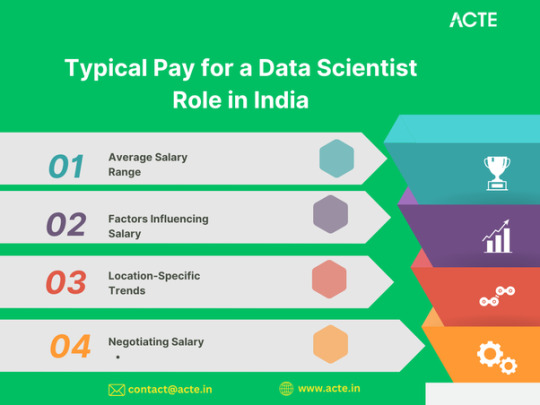
Negotiating Salary
When negotiating a salary for a data scientist role in India, it's essential to research industry standards, consider your experience and skills, and be prepared to articulate your value to the company.
Highlight any relevant certifications, projects, or achievements that demonstrate your expertise and potential contributions to the organization.
The standard compensation for data scientists in India reflects the growing demand for data-driven insights and expertise across industries. With competitive salaries, lucrative benefits, and ample opportunities for career growth and advancement, the field continues to attract top talent seeking to make a meaningful impact through data analysis and innovation. As the data science landscape evolves, professionals can expect continued demand for their skills and expertise, driving further enhancements in compensation and opportunities for success.
In summary, while compensation levels can vary based on multiple factors, data scientists in India can anticipate rewarding careers with competitive remuneration and exciting prospects for growth and development in this dynamic field.
0 notes
Text
A Glimpse into the Future: Data Scientist Opportunities in India
In recent years, India has emerged as a global hub for technology and innovation, and the field of data science is no exception. With its vast talent pool, growing startup ecosystem, and increasing adoption of advanced technologies, India presents a promising landscape for data scientists seeking exciting career opportunities. In this blog, we'll delve into the future of data science in India and explore the burgeoning opportunities it offers.
With the rapid advancement of technology and the increasing reliance on data-driven decision-making, the demand for skilled data scientists is on the rise. In fact, India is currently experiencing a boom in the field of data science, with numerous job opportunities and a growing number of companies investing in data analytics.Enhancing your career at the Data Science Course in Coimbatore entails taking a systematic strategy and looking into enrolling in a suitable course that will greatly expand your learning journey while harmonizing with your preferences.

The Future of Data Scientists in India
1. Growing Demand and Opportunities
Data science is witnessing a surge in demand across industries in India, driven by the increasing digitization of businesses and the proliferation of data.
With companies realizing the potential of data-driven decision-making, the demand for skilled data scientists is expected to continue growing in the future.For those looking to excel in Data Science, Data Science Online Training is highly suggested. Look for classes that align with your preferred programming language and learning approach.
2. Role in Driving Innovation
Data scientists play a crucial role in driving innovation by analyzing data to uncover insights, patterns, and trends that can inform strategic decisions and product development.
As businesses strive to stay competitive in a rapidly evolving landscape, the role of data scientists in driving innovation will become even more pronounced.
3. Integration with Emerging Technologies
Data science is closely intertwined with emerging technologies such as artificial intelligence (AI), machine learning (ML), and big data analytics.
As these technologies continue to evolve and mature, the role of data scientists in harnessing their potential to solve complex problems and drive business value will become increasingly important.
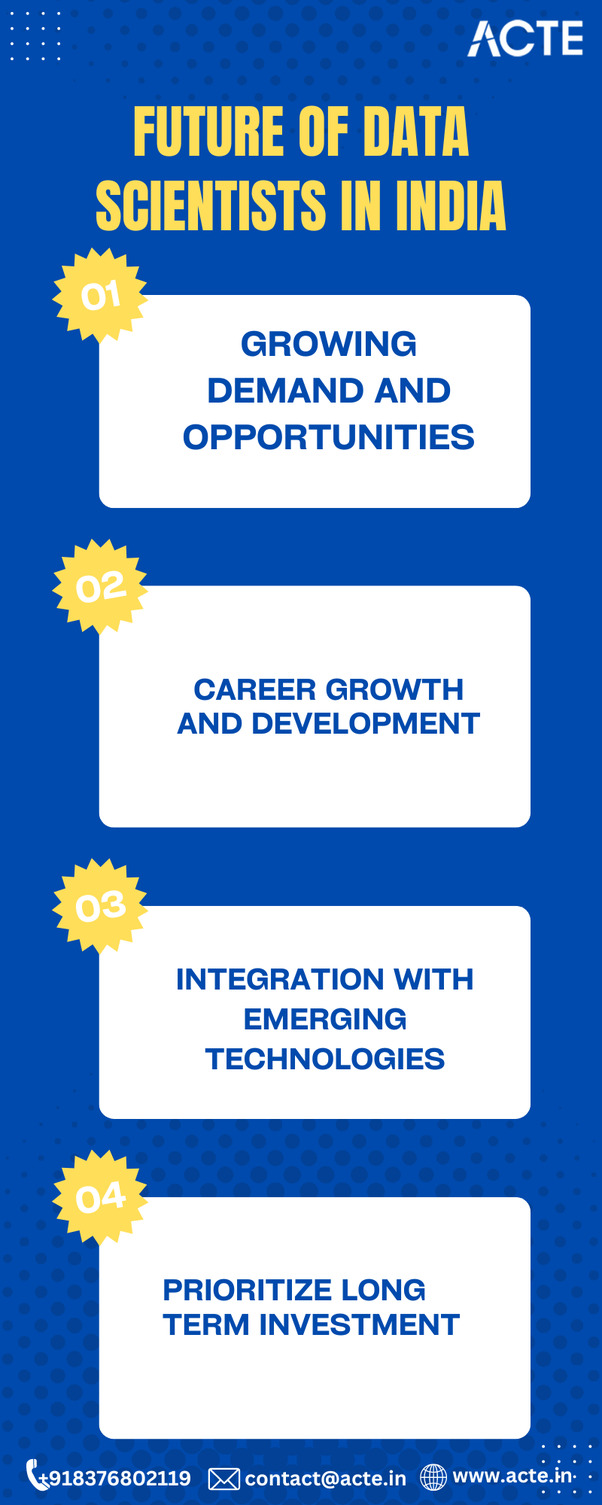
4. Career Growth and Development
The future looks bright for data scientists in India, with abundant opportunities for career growth and development.
As companies invest in building robust data science teams and establishing data-driven cultures, data scientists can expect to take on more challenging roles and responsibilities, further enhancing their skills and expertise.
In conclusion, the future looks bright for data scientists in India. With a growing demand for their expertise, expanding opportunities in emerging technologies, and a vibrant ecosystem of startups and enterprises, India offers an exciting landscape for professionals looking to embark on a rewarding career in data science. By staying abreast of industry trends, honing their skills, and embracing a culture of innovation, data scientists can unlock limitless possibilities and contribute to shaping a data-driven future for India and beyond.
0 notes
Text
From Passion to Profession: The Evolution of Self-Made Data Scientists
In the digital era, data science has emerged as a transformative field, blending mathematics, statistics, computer science, and domain knowledge to derive insights from data. Yet, amidst the structured frameworks of academia and corporate training programs, there exists a breed of data scientists who forged their path from passion to profession through self-directed learning and hands-on experience.
These self-made data scientists epitomize the spirit of curiosity and determination. They often start their journey fueled by a deep interest in understanding patterns, solving problems, or simply exploring the vast landscape of data. Armed with determination and an insatiable appetite for learning, they embark on a journey that is as challenging as it is rewarding.
Overall, becoming a self-made data scientist requires dedication, continuous learning, and practical application of knowledge. By following these steps and investing time and effort into honing your skills, anyone can embark on an exciting career in data science. Enhancing your career at the Data Science Course in Coimbatore entails taking a systematic strategy and looking into enrolling in a suitable course that will greatly expand your learning journey while harmonizing with your preferences.
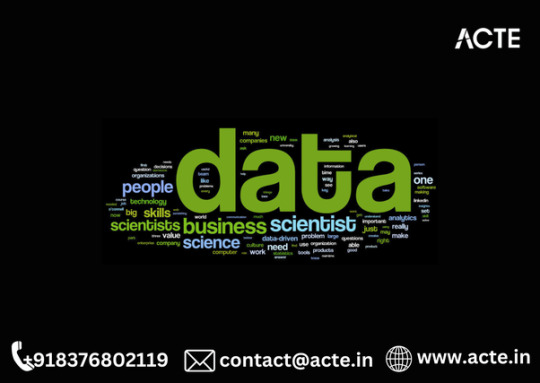
How I did it:
1. Found My Passion for Data Science:
Discovered my interest in data science through online courses, articles, and tutorials.
Realized the potential of data in solving real-world problems and making informed decisions.
2. Self-Study and Continuous Learning:
Utilized online resources like Coursera, edX, and Kaggle to learn foundational concepts in statistics, programming, and machine learning.
Engaged in self-study to grasp advanced topics and stay updated with the latest developments in the field.
3. Hands-On Projects and Practice:
Worked on personal projects to apply theoretical knowledge and gain practical experience.
Participated in hackathons, competitions, and data challenges to solve diverse problems and enhance my skills.
4. Networking and Collaboration:
Joined data science communities, forums, and meetups to connect with like-minded individuals and professionals in the field.
Collaborated on projects with peers to leverage collective expertise and learn from diverse perspectives.
5. Seeking Mentorship and Guidance:
Found mentors within the data science community who provided valuable advice, feedback, and guidance throughout my journey.
Leveraged mentorship opportunities to accelerate my learning, overcome challenges, and navigate career decisions. For individuals eager to excel in Data Science, exploring Data Science Online Training is highly recommended. Look for classes that align with your preferred programming language and learning approach.
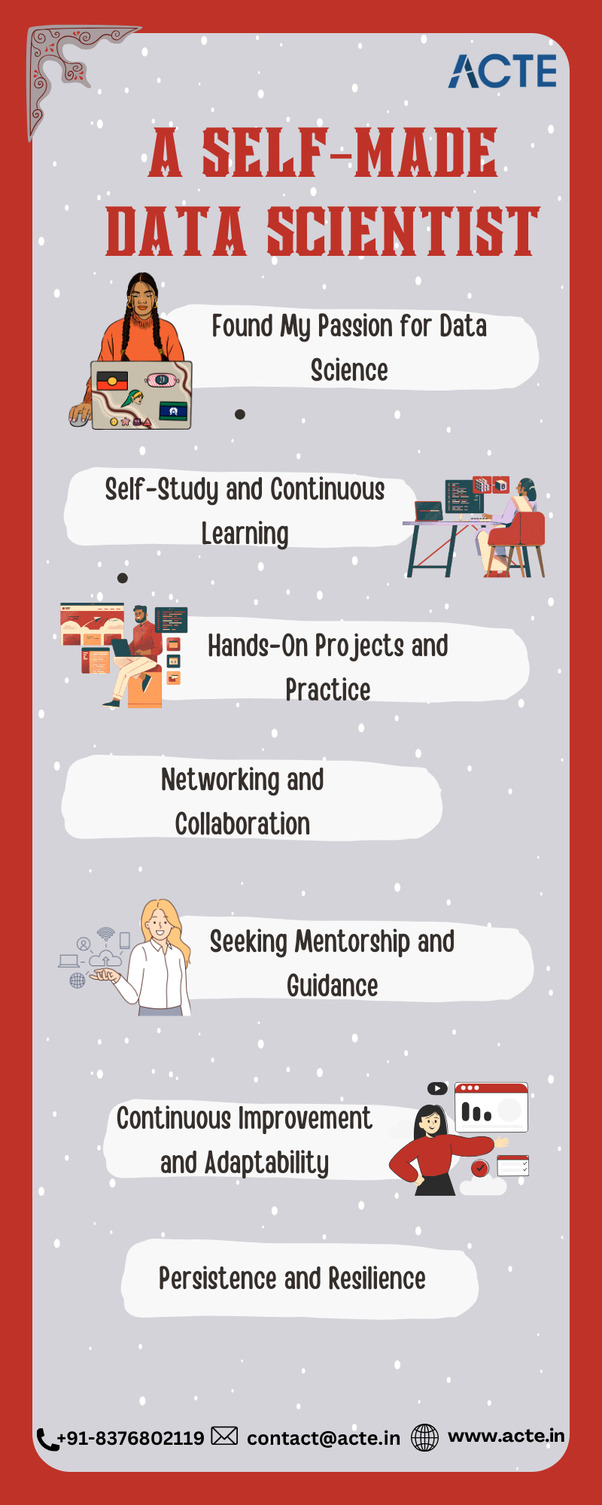
6. Continuous Improvement and Adaptability:
Embraced a growth mindset and committed to continuous improvement through feedback, reflection, and iteration.
Adapted to evolving technologies, methodologies, and industry trends to stay relevant and competitive in the field.
7. Persistence and Resilience:
Recognized that success in data science requires perseverance, resilience, and a willingness to embrace failures as learning opportunities.
Overcame setbacks, challenges, and obstacles with determination and a positive attitude.
In conclusion, the evolution of self-made data scientists is a testament to the power of passion, perseverance, and self-directed learning. Through their unwavering dedication and relentless pursuit of knowledge, they have transformed their passion for data into a fulfilling profession, leaving an indelible mark on the ever-expanding landscape of data science.
0 notes
Text
Navigating the Path to Becoming a Data Scientist in India
In the ever-evolving landscape of technology, data science has emerged as a dynamic and high-demand field globally, and India is no exception. With its vast pool of talent and burgeoning tech industry, India offers numerous opportunities for individuals aspiring to pursue a career in data science. However, navigating the path to becoming a data scientist can be daunting without proper guidance. In this blog, we'll explore the essential steps and strategies to successfully navigate the journey towards becoming a data scientist in India
Enhancing your career at the Data Science Course in Coimbatore entails taking a systematic strategy and looking into enrolling in a suitable course that will greatly expand your learning journey while harmonizing with your preferences.

1. Gain a Strong Educational Background
Pursue a bachelor's degree in a relevant field such as computer science, mathematics, statistics, or engineering.
Consider obtaining a master's degree or a certification in data science or related disciplines for advanced knowledge and skills.
2. DevelopTechnical Skills
Learn programming languages such as Python, R, and SQL, which are commonly used in data science.
Master statistical techniques, machine learning algorithms, and data visualization tools to analyze and interpret data effectively.
3. Build a Portfolio
Work on data science projects independently or through internships to gain hands-on experience.
Showcase your projects, achievements, and skills through a professional portfolio or online platforms like GitHub.
4. Stay Updated with Industry Trends
Stay abreast of the latest developments, tools, and techniques in the field of data science through online courses, workshops, and conferences.
Follow influential data scientists, join online communities, and participate in discussions to network and learn from others in the industry.For those looking to excel in Data Science, Data Science Online Training is highly suggested. Look for classes that align with your preferred programming language and learning approach.
5. Gain Practical Experience
Apply for entry-level data science positions, internships, or freelance projects to gain practical experience and exposure to real-world scenarios.
Seek opportunities to work with diverse datasets across different domains to broaden your expertise.
6. Cultivate Soft Skills
Develop strong communication, problem-solving, and critical thinking skills to effectively communicate findings and collaborate with stakeholders.
Enhance your ability to work in teams, manage projects, and adapt to changing requirements and environments.
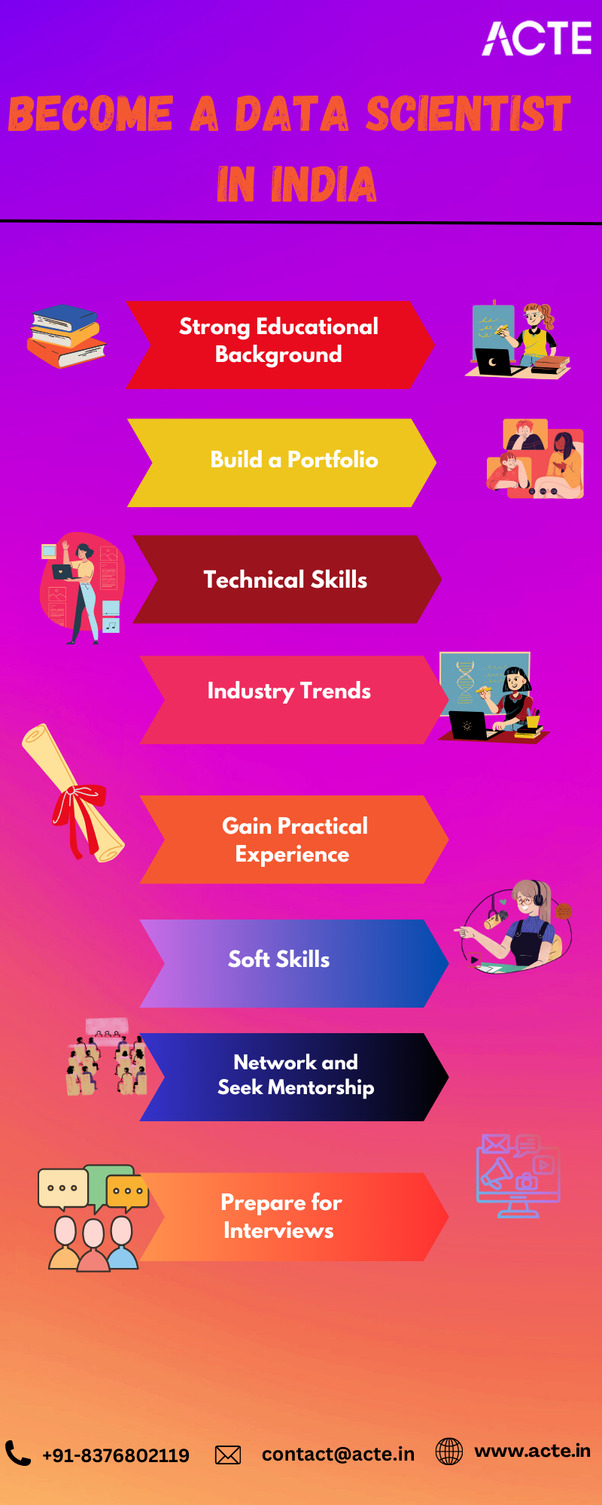
7. Network and Seek Mentorship
Connect with professionals in the data science field through networking events, online forums, and LinkedIn.
Seek mentorship from experienced data scientists who can provide guidance, advice, and support throughout your journey.
8. Prepare for Interviews
Practice technical and behavioural interview questions commonly asked in data science job interviews.
Highlight your technical skills, problem-solving abilities, and past experiences during interviews to demonstrate your suitability for the role.
Becoming a data scientist in India requires dedication, continuous learning, and perseverance. By acquiring the necessary skills, building a strong portfolio, networking with industry professionals, and staying updated on emerging trends, you can position yourself for success in this rapidly growing field. Whether you're a recent graduate or a seasoned professional looking to transition into data science, the opportunities abound for those willing to embark on the exciting journey of becoming a data scientist in India.
0 notes
Text
Decoding the Enigma: Understanding the Difficulties of Breaking into Data Science
Data science has emerged as one of the most sought-after fields in recent years, promising lucrative career opportunities and the ability to extract valuable insights from vast amounts of data. However, breaking into the realm of data science is not as straightforward as it may seem. In this blog post, we will delve into the complexities and challenges that aspiring data scientists often face on their journey into this enigmatic field.
I will explore some of the key reasons why breaking into data science can be difficult.Enhancing your career at the Data Science Course in Coimbatore involves taking a systematic approach and exploring enrollment in a fitting course, which can significantly enrich your learning journey while aligning with your interests.

1. High Demand, Limited Supply
Limited Talent Pool: Data science requires a unique blend of skills including statistics, programming, and domain knowledge. Finding individuals proficient in all these areas can be challenging.
Growing Demand: With businesses across industries increasingly relying on data-driven decision-making, the demand for data scientists has surged. This high demand exacerbates the competition for available positions.
2. Evolving Field
Rapid Technological Advancements: Data science tools, techniques, and methodologies are constantly evolving. Staying abreast of these changes requires continuous learning and adaptation.
Interdisciplinary Nature: Data science intersects with various fields such as mathematics, computer science, and business. Mastering all these domains takes time and effort.
3. Lack of Experience
Entry-Level Expectations: Many data science roles require prior experience, even for entry-level positions. This catch-22 situation makes it challenging for newcomers to break into the field.
Practical Application: Employers often prioritize candidates with practical experience working on real-world data science projects. Gaining this experience can be difficult without access to relevant opportunities. For individuals eager to excel in Data Science, exploring Data Science Online Training is highly recommended. Look for courses that suit your preferred programming language and learning style.
4. Educational Barriers
Specialized Education: While there are many online courses and resources available, formal education in data science or related fields can be expensive and time-consuming.
Prerequisites: Data science programs typically have prerequisites in mathematics, statistics, and programming, which may deter individuals from pursuing this career path.
5. Networking and Soft Skills
Networking: Like in many other industries, connections and networking play a crucial role in securing data science opportunities. Building a professional network can be challenging, especially for those new to the field.
Soft Skills: In addition to technical proficiency, data scientists need strong communication, problem-solving, and critical thinking skills. Developing these soft skills takes time and practice
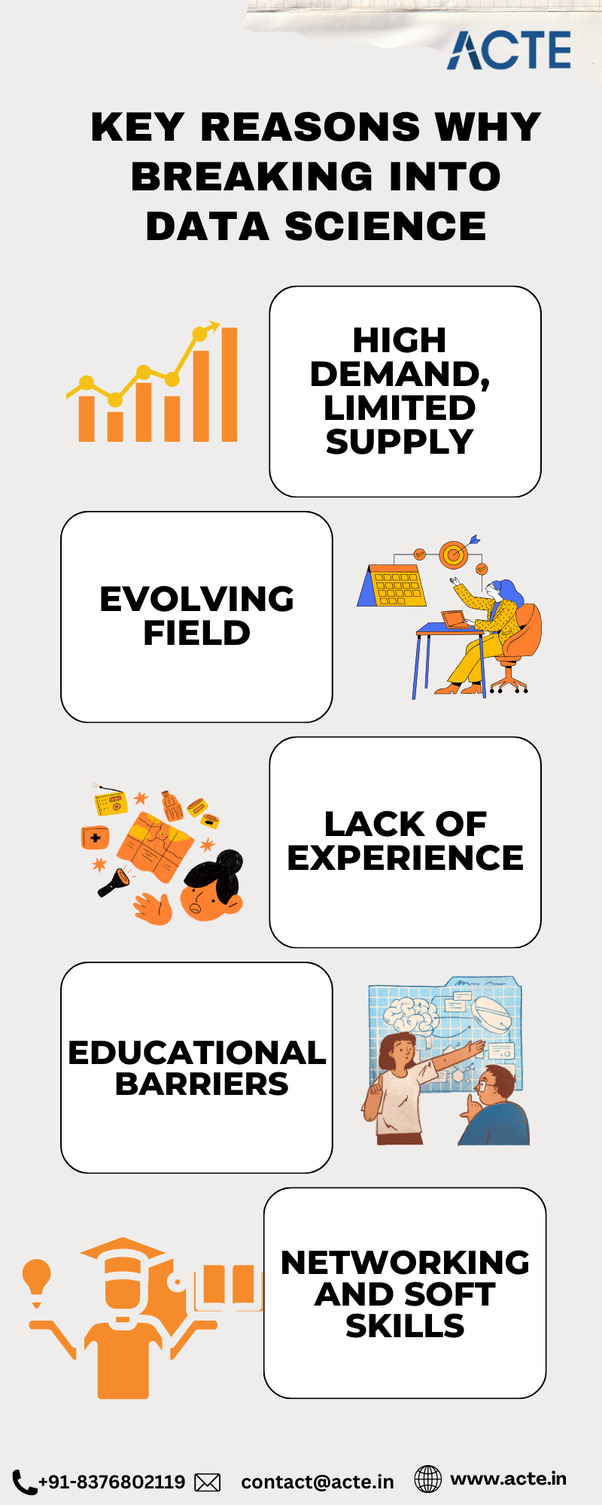
Despite these challenges, breaking into data science is not impossible. With dedication, perseverance, and a strategic approach, individuals can increase their chances of success. Pursuing relevant education and certifications, working on personal projects to showcase skills, and building a strong professional network are some strategies that can help aspiring data scientists overcome barriers and break into this exciting field.
Breaking into data science is akin to deciphering an enigma, requiring a combination of technical skills, practical experience, and perseverance. While the journey may be challenging, it is also immensely rewarding, offering the opportunity to unravel insights hidden within data and make meaningful contributions to various industries. By understanding and addressing the difficulties inherent in the field, aspiring data scientists can embark on their journey with clarity and determination.
0 notes
Text
Why Statistics is the Backbone of Data Science: Key Insights for Beginners and Experts Alike
In the vast landscape of data science, one element stands out as the bedrock upon which the entire discipline rests: statistics. Whether you're just starting your journey into the world of data or you're a seasoned expert, understanding the importance of statistics is essential. In this blog post, we'll delve into why statistics is the backbone of data science, offering insights that are valuable for beginners and experts alike.
Level up your data skills in Pune! Join our top-notch data science training in Pune program now and become an expert in no time. Don't miss out - enroll today and unlock endless career opportunities!
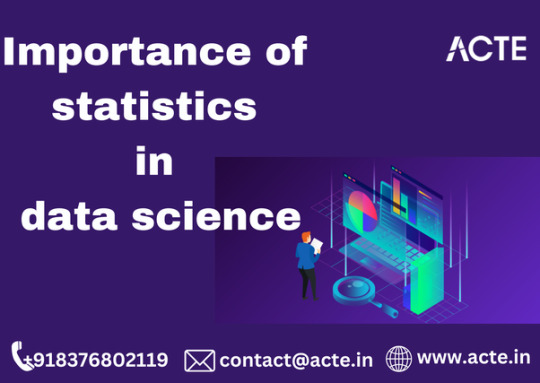
Why are statistics important in data science?
Statistics is essential in data science because it enables data scientists to make sense of the data they are working with. By utilizing statistical techniques, data scientists can uncover patterns, relationships, and correlations within the data, enabling them to make informed conclusions and predictions.
One of the key reasons why statistics is important in data science is that it helps in making accurate and reliable decisions based on data. Statistics provides the framework for validating models and ensuring the reliability and accuracy of analyses. It helps data scientists choose the right sample size, interpret confidence intervals, and make robust decisions based on data.
Moreover, statistics allows data scientists to navigate the complexities of data. It helps in summarizing and describing data through descriptive statistics, enabling data scientists to understand the characteristics of the dataset. Additionally, inferential statistics helps in making inferences and drawing conclusions about populations based on sample data.
Key statistical concepts and techniques in data science
To understand the importance of statistics in data science, it is crucial to be familiar with key statistical concepts and techniques. These concepts and techniques provide the foundation for data analysis and interpretation.
Descriptive statistics in data science
Descriptive statistics deals with summarizing and describing data. It involves measures such as mean, median, and standard deviation, which help in understanding the central tendency and variability of the data. Descriptive statistics provide insights into the distribution and characteristics of the dataset, enabling data scientists to gain a better understanding of the data.
Inferential statistics in data science
Inferential statistics is used to make inferences and draw conclusions about populations based on sample data. It involves techniques such as hypothesis testing and confidence intervals. By using inferential statistics, data scientists can make generalizations and predictions about the larger population, even with limited data.Supercharge your career with our cutting-edge data science online training! Boost your skills, land your dream job, and reach new heights. Don't miss out - enroll today and become a data science champion!
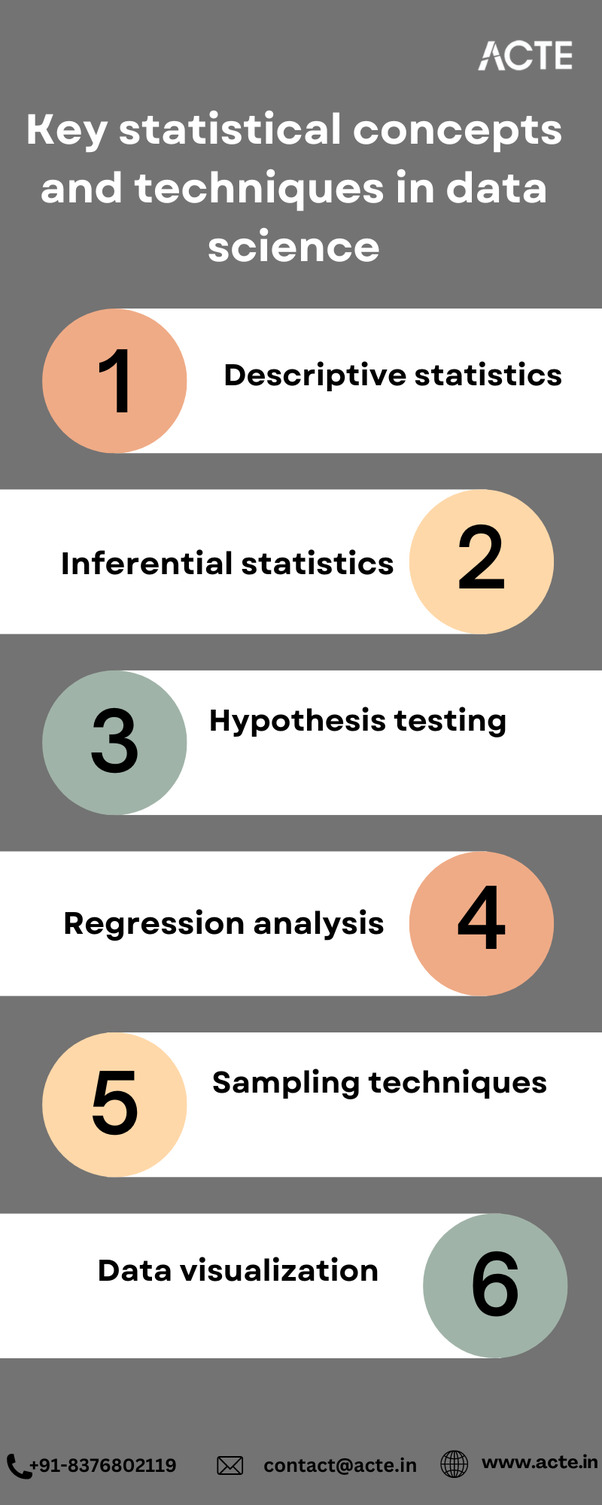
Hypothesis testing in data science
Hypothesis testing is an important statistical technique in data science that allows data scientists to test the validity of assumptions or claims made about a population. By formulating null and alternative hypotheses and analyzing the sample data, data scientists can determine whether there is enough evidence to support or reject the hypotheses. Hypothesis testing helps in making data-driven decisions and drawing meaningful conclusions.
Regression analysis in data science
Regression analysis is a statistical technique used to model and analyze the relationship between dependent and independent variables. It helps in understanding how changes in one variable affect another. Regression analysis enables data scientists to predict outcomes, identify patterns, and make informed decisions based on the relationships between variables. It is widely used in various fields such as economics, marketing, and social sciences.
Sampling techniques in data science
Sampling techniques are used to select a subset of data from a larger population. It is not always feasible or practical to analyze the entire dataset, especially when dealing with large datasets. Various sampling techniques such as random sampling and stratified sampling help data scientists obtain representative samples that provide accurate insights about the population. Sampling techniques are essential in data science as they allow for efficient and effective analysis of data.
Data visualization and statistics
Data visualization plays a crucial role in data science as it helps in presenting complex data in a visually appealing and understandable format. By using statistical techniques, data scientists can create meaningful and informative visualizations that enable stakeholders to easily grasp the insights and trends within the data. Data visualization enhances the communication of statistical findings and facilitates data-driven decision-making.
From exploratory data analysis to predictive modeling, statistics serves as the cornerstone of data science. Whether you're just starting your journey into the field or you're a seasoned practitioner, a solid understanding of statistical principles is essential. By embracing statistics as the backbone of data science, practitioners can unlock deeper insights, make more robust decisions, and navigate the complexities of the data-driven world with confidence.
0 notes
Text
Unveiling the Discrepancy: Database versus Data Science
In the ever-evolving landscape of technology and data, two terms often arise, causing a ripple of confusion among enthusiasts and professionals alike: database and data science. While they both deal with data, they serve distinct purposes and operate on different levels of abstraction. Understanding the discrepancy between the two is crucial for anyone navigating the realms of data management and analysis.
Database and data science work together in a symbiotic relationship, each supporting and enhancing the other. Databases provide the foundation for data storage and management, making data accessible to data scientists. Without databases, data scientists would spend a significant amount of time and effort collecting and cleaning data, hindering their ability to perform analysis.
Data science, on the other hand, adds value to databases by uncovering insights and patterns within the data. Data scientists use statistical and analytical techniques to analyze large volumes of data, identifying trends and relationships that may not be immediately apparent. These insights can then be used to guide decision-making and drive business growth. Difference Between Database and Data Science. Unlock the power of data with our cutting-edge data science training in Pune. Level up your skills and become a data wizard today!
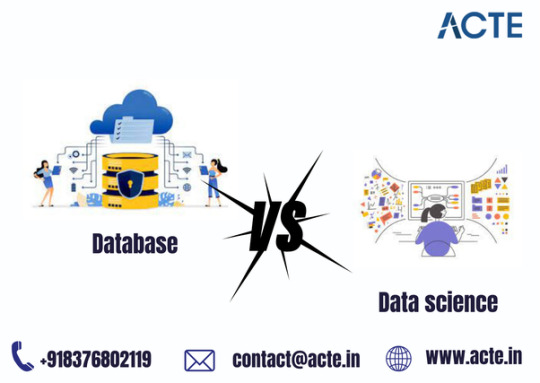
Understanding Database
Definition: A database is a structured collection of data organized for efficient retrieval, storage, and management.
Purpose: Databases are designed to store and retrieve data, ensuring data integrity, security, and consistency.
Examples: MySQL, PostgreSQL, MongoDB, Oracle, SQL Server.
Exploring Data Science
Definition: Data science is a multidisciplinary field that involves extracting insights and knowledge from data using various techniques and methodologies.
Purpose: Data science focuses on analyzing and interpreting data to uncover patterns, trends, and correlations for decision-making and prediction.
Components: Data science encompasses data analysis, machine learning, statistical modelling, and data visualization.
Key Differences
1. Focus:
Database: Primarily focuses on storing, organizing, and retrieving structured data efficiently.
Data Science: Focuses on analyzing and interpreting data to extract insights and make informed decisions.
2. Usage:
Database: Used for data storage, retrieval, and management, ensuring data integrity and security.
Data Science: Used for analyzing and interpreting data to derive actionable insights and predictions, driving decision-making."Unlock the limitless possibilities of data science online training. Enrol now and become a data wizard!"
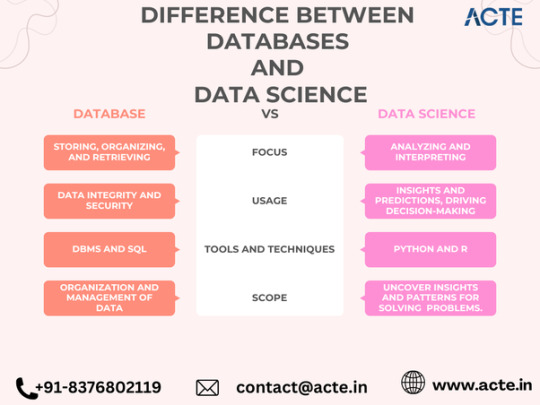
3. Tools and Techniques:
Database: Utilizes database management systems (DBMS) and query languages like SQL for data manipulation and retrieval.
Data Science: Utilizes programming languages like Python and R, along with tools and libraries for data analysis, machine learning, and statistical modelling.
4. Scope:
Database: Focuses on the organization and management of data within a structured framework.
Data Science: Explores data from various sources, including databases, to uncover insights and patterns for solving complex problems.
In conclusion, while databases and data science may seem interchangeable at first glance, they serve distinct roles in the realm of data management and analysis. Databases provide the foundation for storing and accessing data, while data science extracts insights and knowledge from this data. By understanding the discrepancy between the two and embracing their complementary nature, organizations can harness the full potential of their data assets, driving innovation, and gaining a competitive edge in today’s data-driven world.
0 notes
Text
Exploring Promising Career Paths in the Field of Data Science
In an era defined by data, the role of data scientists has become indispensable across various industries. With the exponential growth of data generation and the advancements in technology, the field of data science offers a plethora of promising career paths. From machine learning to data engineering, professionals in this field have the opportunity to delve into diverse domains and make significant contributions. In this blog, we'll explore some of the exciting career paths within the realm of data science and discuss the skills and qualifications needed to excel in each of them.
So, if you're considering a career in data science, you're definitely on the right track! Choosing the data science training in Pune placements can further accelerate your journey into this thriving industry.
To give you an idea of the job opportunities in this field, let's dive into some key statistics. According to a recent report by Analytics India Magazine, the number of data science job openings in India has increased by a staggering 76% in the last year alone. This is a clear indication of the growing demand for skilled data scientists in the country.

Popular Job Opportunities in Data Science
Data Scientist: The role of a data scientist is to analyze large datasets and extract meaningful insights from them. They use statistical techniques and machine learning algorithms to uncover patterns, trends, and correlations in the data. Data scientists are in high demand across industries such as finance, healthcare, e-commerce, and technology.
Data Analyst: Data analysts focus on collecting, organizing, and analyzing data to help businesses make informed decisions. They work closely with stakeholders to understand their needs and then use various tools and techniques to extract insights from the data. Data analysts play a crucial role in identifying trends, spotting anomalies, and generating reports that drive business growth.
Machine Learning Engineer: Machine learning engineers develop and deploy machine learning models that can automatically learn from data and make predictions or take actions without being explicitly programmed. They work closely with data scientists to implement and optimize machine learning algorithms and ensure they are running efficiently in production environments.
Business Intelligence Analyst: Business intelligence analysts are responsible for gathering, analyzing, and visualizing data to provide actionable insights to stakeholders. They create dashboards, reports, and presentations that help businesses monitor performance, identify areas for improvement, and make strategic decisions. Choosing the data science online training is a crucial step in acquiring the necessary expertise for a successful career in the evolving landscape of data science.
Data Engineer: Data engineers build and manage the infrastructure required for storing, processing, and analyzing large volumes of data. They design and maintain databases, data pipelines, and data warehouses that support the needs of data scientists and analysts. Data engineers also ensure data quality and security throughout the entire data lifecycle.
Data Architect: Data architects are responsible for designing the overall structure and organization of an organization's data assets. They work closely with stakeholders to understand their requirements and then design databases, data models, and information systems that support those needs. Data architects also ensure that data is integrated across different systems and platforms.
Data Visualization Specialist: Data visualization specialists create compelling visualizations that communicate complex data clearly and concisely. They use various tools and techniques to transform raw data into meaningful charts, graphs, and interactive dashboards that help businesses understand trends, identify patterns, and make informed decisions.
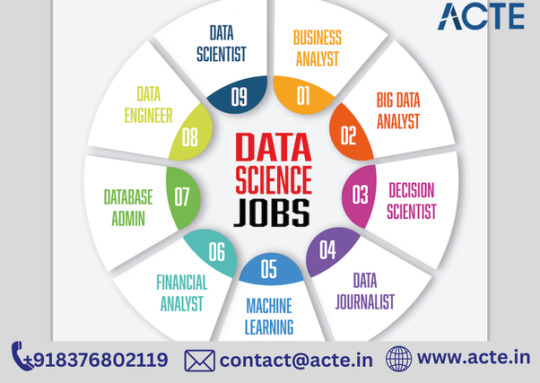
If you're considering a career in data science in India, you'll be pleased to know that there is a wealth of job opportunities waiting for you.
The field of data science offers a wide range of exciting career paths, each requiring a unique set of skills and qualifications. Whether you're passionate about predictive modeling, machine learning, data engineering, or business intelligence, there are ample opportunities to pursue a rewarding career in data science. By acquiring the necessary skills, gaining hands-on experience, and staying updated with the latest advancements in the field, you can embark on a fulfilling journey towards becoming a successful data professional.
0 notes
Text
Your Step-by-Step Guide to Mastering the Art of Data Science
In today's data-driven world, the demand for skilled data scientists is on the rise. Whether you're a novice looking to break into the field or an experienced professional aiming to enhance your skills, mastering the art of data science is a rewarding journey. In this step-by-step guide, we'll outline a comprehensive approach to help you become proficient in data science.
With a Data Science Course in Pune, professionals can gain the skills and knowledge needed to harness the capabilities of Data Science for diverse applications and industries.

Steps to become a data scientist:
Master the fundamentals: To start your data science journey, it's important to have a strong foundation in mathematics and statistics. Brush up on your knowledge of calculus, linear algebra, probability, and statistics. These subjects will form the basis of your understanding of data analysis and modelling.
Develop programming skills: Data scientists frequently use programming languages such as Python and R for data analysis and modelling. Familiarize yourself with these languages and their libraries, such as NumPy, pandas, and sci-kit-learn in Python, or dplyr and ggplot2 in R. These libraries provide powerful tools for data manipulation, visualization, and machine learning.
Gain hands-on experience with real-world projects: Theory alone is not enough in data science. Employers value practical experience, so it's essential to work on real-world projects. Start by exploring public datasets available on platforms like Kaggle or GitHub. This will help you get hands-on experience in cleaning, analyzing, and visualizing data.
Learn machine learning techniques: Machine learning is a crucial aspect of data science. Algorithms like linear regression, decision trees, random forests, and neural networks are widely used to make predictions and gain insights from data. Familiarize yourself with these techniques and understand when to apply them based on different problem domains. To master the intricacies of Data Science and unlock its full potential, individuals can benefit from enrolling in the Data Science Online Training.
Stay updated with industry trends: The field of data science is constantly evolving, so it's important to stay updated with the latest industry trends and advancements. Follow influential blogs, join online communities like Kaggle or Data Science Central, attend conferences and webinars, and subscribe to newsletters to stay informed about the latest tools, techniques, and best practices.
Pursue relevant education or certifications: While a formal degree in data science or related fields can be beneficial, it is not always necessary. There are numerous online courses and certifications available that can provide you with the necessary knowledge and skills. Some popular options include Coursera's Data Science Specialization, edX's Data Science MicroMasters program, or Udacity's Data Scientist Nanodegree.
Network with professionals in the field: Networking is crucial for career growth in any field, and data science is no exception. Attend industry events or meetups, participate in online forums or Slack communities dedicated to data science, and connect with professionals on LinkedIn. Building connections can lead to valuable mentorship opportunities or even job referrals.
Build a strong portfolio: A portfolio of your projects is essential for showcasing your skills to potential employers. Create a personal website or GitHub repository where you can showcase your data analysis projects, code samples, visualizations, and any other relevant work you've done.
Apply for internships or entry-level positions: Once you feel confident in your skills and have built a strong portfolio, start applying for internships or entry-level positions in data science. These opportunities will provide valuable industry experience and help you further refine your skills.
Never stop learning: Data science is a rapidly evolving field with new techniques and technologies emerging regularly. It's crucial to continue learning and expanding your skill set throughout your
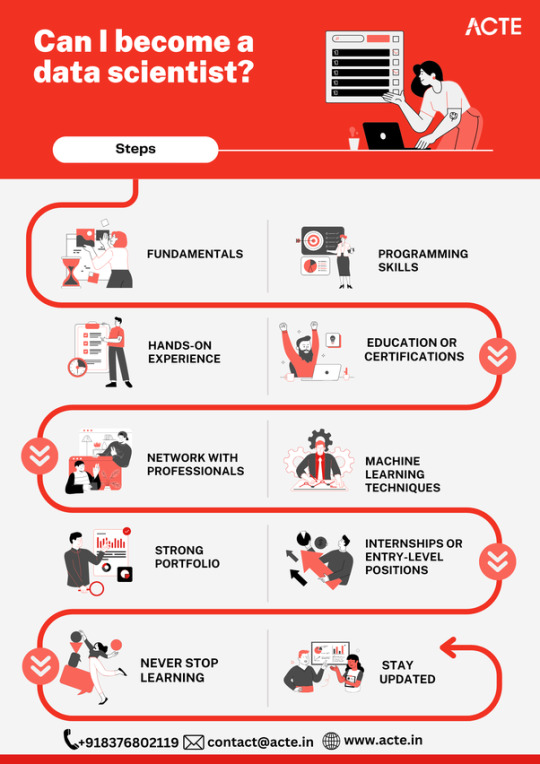
By following these steps and continuously learning and improving your skills, you can embark on a successful career as a data scientist and make valuable contributions to the field of data science.
Mastering the art of data science is a journey that requires dedication, persistence, and continuous learning. By following this step-by-step guide and embracing a hands-on approach, you can develop the skills and expertise needed to excel in this exciting field. Remember to stay curious, be creative, and never stop exploring the endless possibilities of data science.
0 notes
Text
Exploring the Life of a Data Scientist: An In-Depth Look
In today's era of digital transformation and big data, the role of a data scientist has become increasingly crucial across various industries. From uncovering insights to driving decision-making processes, data scientists play a pivotal role in extracting value from data. In this blog post, we'll take an in-depth look into the life of a data scientist, exploring their responsibilities, skills, challenges, and the evolving landscape of data science.
With Data Science Training in Pune, professionals can gain the skills and knowledge needed to harness the capabilities of data for diverse applications and industries.

1. Diverse and Dynamic Work
As a data scientist, you'll tackle a variety of projects across different industries, from healthcare to finance to e-commerce.
Each project presents unique challenges, keeping the work interesting and engaging.
2. Problem-Solving and Analysis
An important part of your role involves analyzing large datasets to extract valuable insights and solve complex problems.
You'll use statistical techniques, machine learning algorithms, and data visualization tools to derive actionable conclusions from data.
3. Collaboration and Communication
Data science is rarely a solo endeavour. You'll collaborate with cross-functional teams, including engineers, analysts, and business stakeholders.
Effective communication skills are essential for conveying technical concepts to non-technical audiences and aligning on project goals. To master the intricacies of data and unlock its full potential, individuals can benefit from enrolling in the Data Science Online Training.
4. Continuous Learning and Innovation
Data science is constantly evolving, with new techniques and technologies emerging regularly.
You must stay updated on the latest trends and developments, embracing lifelong learning to remain competitive.
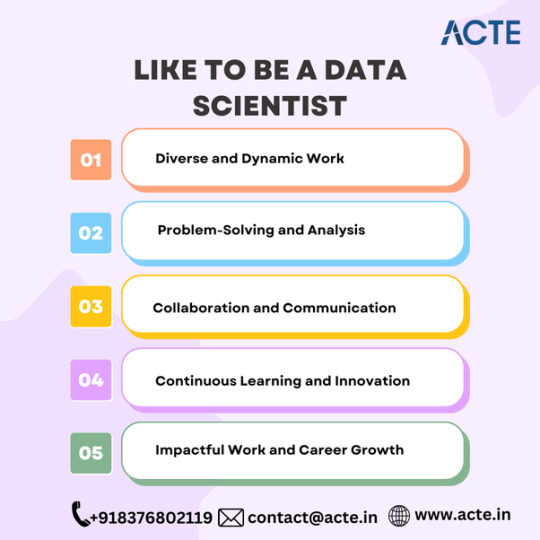
5. Impactful Work and Career Growth
Data science has a direct impact on business decisions and strategies, making your contributions highly valuable to organizations.
With experience and expertise, you can advance your career into leadership roles or specialize in areas like artificial intelligence or big data analytics.
It's important to note that being a data scientist is not just about crunching numbers and running algorithms. It also requires a curious mindset and a passion for learning. The field of data science is constantly evolving, with new techniques and technologies emerging all the time. As a data scientist, it's important to stay up-to-date with the latest developments and continuously expand your skillset.
In conclusion, the life of a data scientist is dynamic, challenging, and rewarding. From collecting and cleaning data to building predictive models and communicating insights, data scientists play a critical role in driving business success and innovation in today's data-driven world. As the field continues to evolve, data scientists must adapt, continuously learn, and stay abreast of emerging trends to excel in their profession.
0 notes
Text
The Ultimate Guide to Excelling in Data Science
In the realm of data science, where the convergence of programming, statistics, and domain expertise is crucial, excelling requires more than just technical prowess. It demands a holistic approach encompassing both hard and soft skills, along with a strategic mindset. Whether you're a novice navigating the vast sea of data or an experienced practitioner seeking to elevate your craft, this guide aims to provide actionable insights to help you thrive in the dynamic field of data science
Best Ways to Learn Data Science
1. Online Courses
Platforms like Coursera, edX, and Udemy offer comprehensive data science courses suitable for beginners.
Look for courses covering statistics, machine learning, programming (Python or R), and data visualization. With a Data Science Course in Pune, professionals can gain the skills and knowledge needed to harness the capabilities of Data Science for diverse applications and industries

2. MOOCs (Massive Open Online Courses)
Many universities provide free or low-cost data science courses on platforms like Coursera and edX.
These courses are often taught by experienced professors and offer assignments to reinforce learning.
3. Books
Books such as "Introduction to Statistical Learning" and "Python for Data Analysis" are invaluable resources for learning data science concepts.
Seek out titles that cover topics you're interested in and gradually build your knowledge.
4. Online Tutorials and Blogs
Websites like Towards Data Science and KDnuggets offer a plethora of free tutorials and articles on data science topics.
Explore these resources to supplement your learning and stay updated on industry trends.
5. Kaggle
Participating in Kaggle competitions and completing Kaggle kernels can provide hands-on experience with real-world data.
Engage with the Kaggle community to learn from others and improve your skills.
6. Hands-On Projects
Work on practical data science projects using datasets from platforms like Kaggle or UCI Machine Learning Repository.
Start with small projects and gradually increase complexity as you gain confidence.
To master the intricacies of Data Science and unlock its full potential, individuals can benefit from enrolling in the Data Science Online Training.

7. Networking and Community Involvement
Join data science communities on platforms like Meetup, LinkedIn, and Reddit to connect with peers and industry professionals.
Networking can lead to valuable opportunities for learning and collaboration.
8. Formal Education
Consider pursuing a formal degree or certification in data science if you have the resources and time.
Universities offer online and part-time programs tailored to working professionals.
In conclusion, excelling in data science requires a multifaceted approach encompassing technical expertise, effective communication, continuous learning, ethical awareness, and a resilient mindset. By incorporating these tips and strategies into your journey, you'll be better equipped to navigate the complexities of data science and make meaningful contributions to the field. Remember, excellence is not a destination but a continuous pursuit fueled by passion, curiosity, and perseverance.
0 notes
Text
Demystifying Data Science: A Comprehensive Guide to its Applications
In today's data-driven world, the field of data science has emerged as a cornerstone of innovation and problem-solving across various industries. From business analytics to healthcare, data science techniques are revolutionizing how we extract insights, make decisions, and drive progress. However, for many, the concept of data science remains elusive and complex. In this comprehensive guide, we will delve into the world of data science, demystify its key concepts, and explore its wide-ranging applications.
Unlock the power of data with our groundbreaking data science training in Pune. Start your journey to becoming a data expert today!"

Applications of Data Science
1. Business Intelligence
Data science is widely used in business intelligence to analyze customer behaviour, market trends, and competitor insights.
It helps businesses make informed decisions, optimize operations, and identify new opportunities for growth and innovation.
2. Healthcare
In healthcare, data science is used for predictive analytics, disease detection, and personalized medicine.
It helps healthcare providers improve patient outcomes, optimize resource allocation, and enhance healthcare delivery.
3. Finance
Data science plays a crucial role in finance for fraud detection, risk management, and algorithmic trading.
It helps financial institutions identify fraudulent transactions, assess credit risk, and optimize investment portfolios.
4. Marketing
Data science is utilized in marketing for customer segmentation, targeted advertising, and campaign optimization.
It helps marketers understand consumer behaviour, target the right audience, and maximize marketing ROI.
5. Transportation and Logistics
In transportation and logistics, data science is used for route optimization, demand forecasting, and supply chain management.
It helps companies streamline logistics operations, reduce costs, and improve overall efficiency. Supercharge your career with our cutting-edge data science online training. Don't miss out on this incredible opportunity - enroll now!
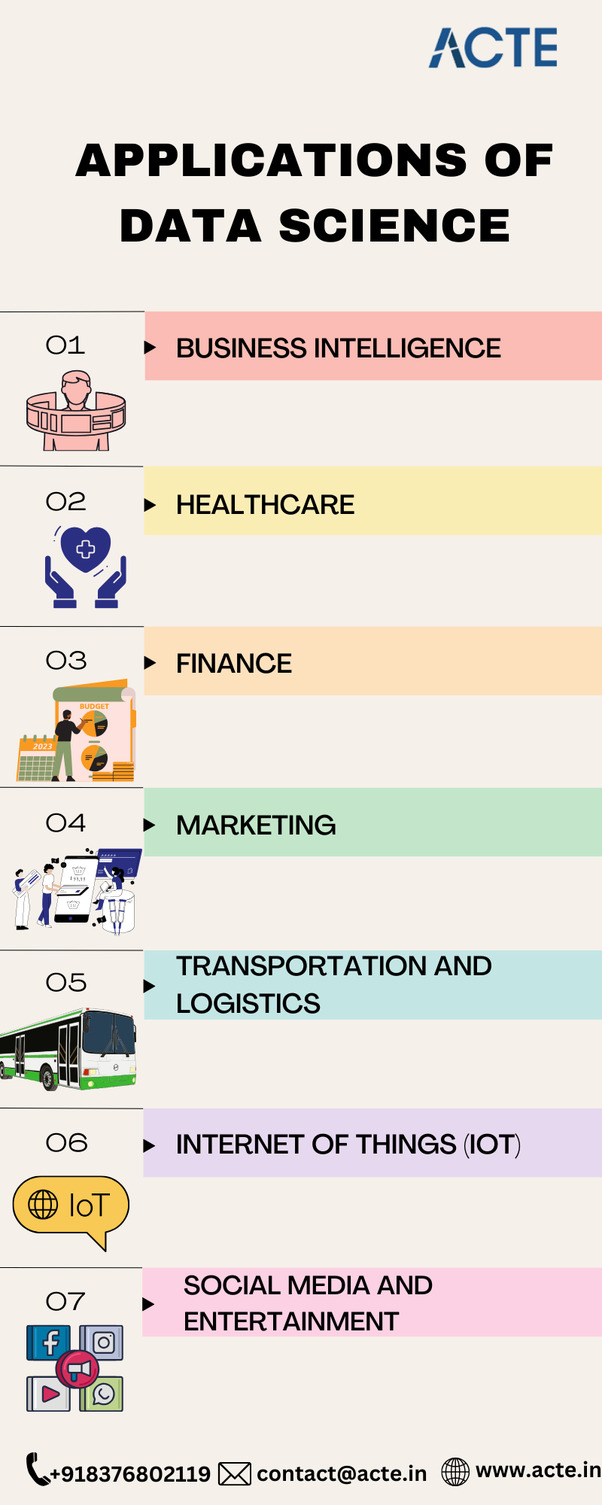
6. Internet of Things (IoT)
With the proliferation of IoT devices, data science is used to analyze sensor data, monitor equipment performance, and optimize maintenance schedules.
It helps companies leverage IoT data to improve product reliability, reduce downtime, and enhance customer satisfaction.
7. Social Media and Entertainment
Data science is employed in social media and entertainment for content recommendation, sentiment analysis, and user engagement prediction.
It helps platforms personalize content, increase user engagement, and enhance overall user experience.
Data science is a powerful tool that empowers organizations to extract value from data and drive innovation across various domains. By understanding its key components and applications, individuals can harness the potential of data science to solve complex problems, make informed decisions, and shape the future of industries worldwide. As data continues to proliferate, the importance of data science will only continue to grow, making it an indispensable skill for the digital age.
0 notes
Text
Decoding the Responsibilities of a Data Scientist
In the fast-paced realm of technology and business, data has become the cornerstone of decision-making. With the exponential growth of data, the role of a data scientist has emerged as one of the most sought-after professions in recent years. However, the responsibilities of a data scientist are often misunderstood or misrepresented. In this blog, we aim to decode the core responsibilities of a data scientist, shedding light on what truly encompasses this multifaceted role.
Unlock the power of data with our groundbreaking data science training in Pune. Start your journey to becoming a data expert today!

Roles and Responsibilities of a Data Scientist's Job
Data scientists play a pivotal role in modern organizations, leveraging data to extract insights and drive strategic decision-making. Below are the detailed roles and responsibilities of a data scientist:
1. Data Analysis:
Data scientists are responsible for analyzing large and complex datasets to uncover patterns, trends, and correlations. This involves using statistical techniques and data visualization tools to extract meaningful insights from the data.
2. Predictive Modeling:
Data scientists develop and deploy machine learning models to make predictions and forecasts based on historical data. These models help organizations anticipate future trends, identify potential risks, and optimize business processes.
3. Data Cleaning and Preparation:
Before analysis, data must be cleaned and prepared to ensure its quality and reliability. Data scientists are tasked with handling missing values, removing outliers, and standardizing data formats to make them suitable for analysis.
4. Feature Engineering:
Feature engineering involves selecting, transforming, and creating new features from raw data to improve the performance of machine learning models. Data scientists need to identify relevant features that can enhance the predictive power of the models. Take your skills to the next level with our cutting-edge data science online training. Join now and unlock your potential
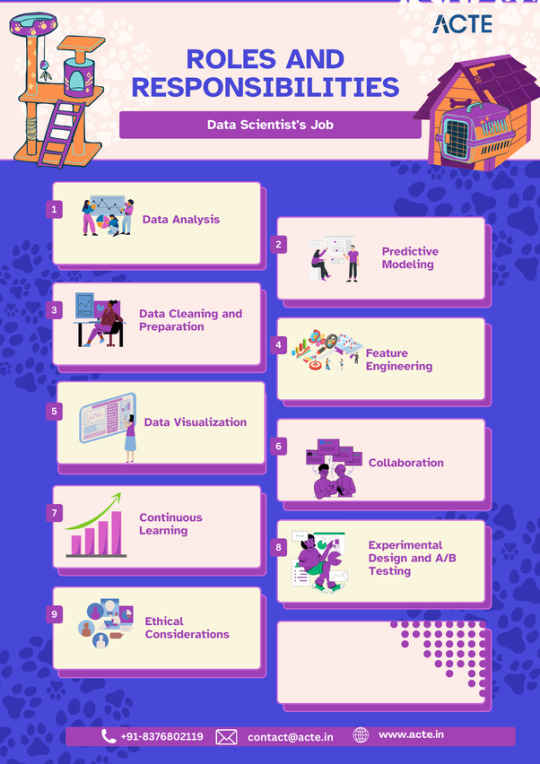
5. Data Visualization:
Communicating insights effectively is crucial in data science. Data scientists use data visualization techniques to present findings clearly and understandably. Visualizations such as charts, graphs, and dashboards help stakeholders interpret complex data easily.
6. Collaboration:
Data scientists work closely with cross-functional teams, including business analysts, engineers, and decision-makers. They collaborate to understand business objectives, define analytical requirements, and implement data-driven solutions that address business challenges.
7. Continuous Learning:
Data science is a rapidly evolving field with new technologies and methodologies emerging regularly. Data scientists are expected to stay updated with the latest advancements, attend workshops, and engage in continuous learning to enhance their skills and expertise.
8. Experimental Design and A/B Testing:
Data scientists design experiments and conduct A/B testing to validate hypotheses, assess the effectiveness of strategies, and optimize processes. They analyze experimental results to derive actionable insights and make data-driven recommendations.
9. Ethical Considerations:
Data scientists must adhere to ethical guidelines and ensure responsible use of data. This involves protecting privacy, maintaining data security, and avoiding biases in data analysis and model development.
In conclusion, the responsibilities of a data scientist are diverse and multifaceted, spanning from data collection and preprocessing to model deployment and maintenance. A successful data scientist possesses a unique blend of technical skills, domain expertise, and effective communication abilities. By understanding and embracing these responsibilities, data scientists can unlock the full potential of data to drive innovation and create value in the digital age.
0 notes
Text
A Comprehensive Roadmap to Achieving Success as a Data Scientist
In today's data-driven world, the role of a data scientist has become increasingly vital across industries. From informing business decisions to driving innovation, data scientists play a crucial role in extracting insights from data to solve complex problems. However, breaking into this field can seem daunting for many aspiring professionals. Fear not! In this comprehensive guide, we will outline a step-by-step approach to help you embark on your journey to becoming a proficient data scientist.
Unlock the power of data with our groundbreaking data science training in Pune. Start your journey to becoming a data expert today!"

Steps to Become a Data Scientist
1. Learn the Fundamentals
Statistics: Understand basic statistical concepts such as probability, hypothesis testing, and regression analysis.
Programming: Gain proficiency in programming languages like Python or R, and learn how to manipulate data using libraries like Pandas and NumPy.
Data Visualization: Familiarize yourself with tools like Matplotlib or Seaborn for creating visualizations to present data insights effectively.
2. Dive into Machine Learning
Algorithms: Learn various machine learning algorithms including linear regression, decision trees, and clustering techniques.
Model Evaluation: Understand how to evaluate the performance of machine learning models using metrics like accuracy, precision, and recall.
Feature Engineering: Master the art of feature selection and extraction to improve model performance.
3. Practice Data Wrangling
Data Cleaning: Learn techniques to clean and preprocess raw data, handling missing values and outliers.
Data Integration: Acquire skills in merging and combining data from different sources to create comprehensive datasets.
4. Gain Domain Knowledge
Industry Understanding: Explore the domain you're interested in, whether it's finance, healthcare, or e-commerce, to understand specific challenges and requirements for data analysis. Supercharge your career with our cutting-edge data science online training. Don't miss out on this incredible opportunity - enroll now!
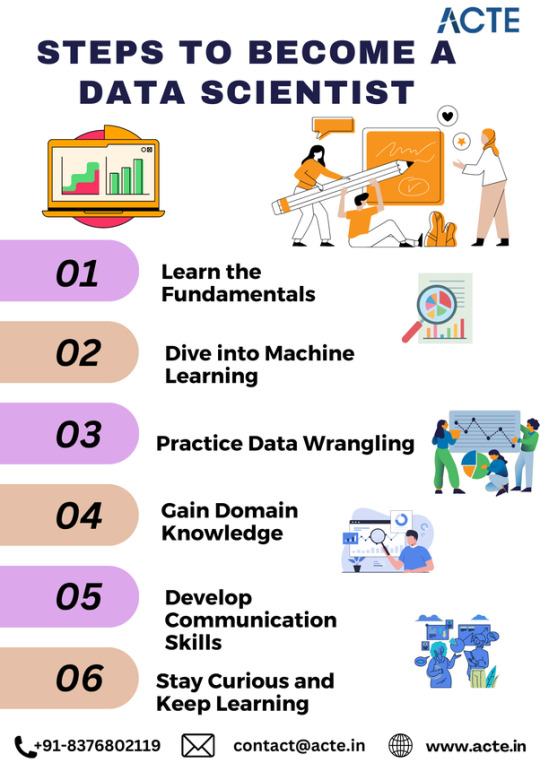
5. Develop Communication Skills
Storytelling: Learn how to communicate complex data insights clearly and compellingly, both verbally and visually.
Collaboration: Work effectively with cross-functional teams, including non-technical stakeholders, to drive data-driven decision-making.
6. Stay Curious and Keep Learning
Continuous Learning: Data science is a rapidly evolving field, so stay updated with the latest trends, tools, and techniques through online courses, books, and workshops.
Practice Projects: Apply your knowledge by working on real-world projects, participating in competitions, or contributing to open-source projects to gain practical experience.
Becoming a successful data scientist requires dedication, perseverance, and a strategic approach. By mastering the fundamentals, gaining practical experience, specializing in a domain, developing advanced skills, cultivating soft skills, building a professional network, and staying curious, you can pave your way to success in the exciting and rewarding field of data science. Remember, the journey to becoming a data scientist is not just about reaching the destination but also about enjoying the learning process and embracing the possibilities along the way. So, start your journey today and embark on the path to a fulfilling career in data science!
0 notes
Text
Key Areas of Expertise Required for Aspiring Data Scientists
In today's data-driven world, the role of data scientists has become increasingly vital across various industries. From analyzing customer behavior to optimizing business processes, data scientists play a crucial role in extracting valuable insights from vast amounts of data. However, becoming a proficient data scientist requires a diverse skill set encompassing various domains. In this blog post, we will explore the key areas of expertise that aspiring data scientists should focus on mastering.
Level up your data skills in Pune! Join our top-notch data science training in Pune program now and become an expert in no time. Don't miss out - enroll today and unlock endless career opportunities!

1. Core Skills
Statistics: Understanding of basic and advanced statistical concepts like probability distributions, hypothesis testing, and regression analysis.
Programming: Proficiency in programming languages commonly used in data science such as Python or R.
Data Manipulation: Ability to work with large datasets and perform data manipulation tasks using libraries like Pandas or NumPy.
Data Visualization: Skills in creating informative and visually appealing visualizations using tools like Matplotlib or Seaborn.
2. Machine Learning
Algorithms: Familiarity with a variety of machine learning algorithms including linear regression, decision trees, random forests, and support vector machines.
Model Evaluation: Knowledge of techniques for evaluating and comparing the performance of machine learning models.
Feature Engineering: Understanding of feature selection, transformation, and creation to improve model performance.
3. Data Wrangling
Data Cleaning: Ability to clean and preprocess raw data, handling missing values, outliers, and inconsistencies.
Data Integration: Skills in merging and combining data from multiple sources to create comprehensive datasets.
4. Domain Knowledge
Industry-Specific Knowledge: Familiarity with the domain you are applying for, whether it's finance, healthcare, e-commerce, etc. Understanding domain-specific challenges and requirements is crucial for effective data analysis.
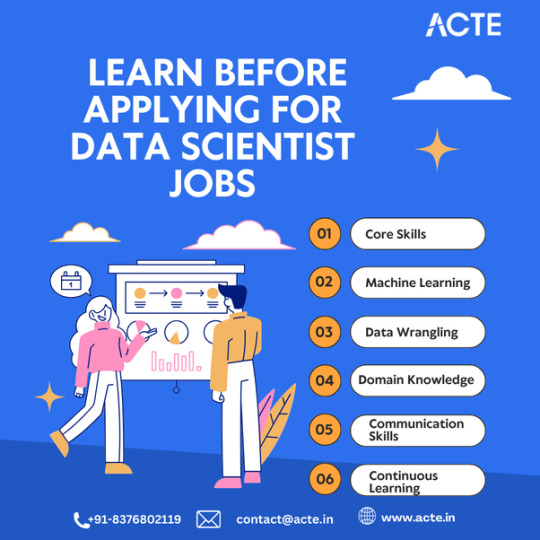
Supercharge your career with our cutting-edge data science online training! Boost your skills, land your dream job, and reach new heights. Don't miss out - enroll today and become a data science champion!
5. Communication Skills
Storytelling: Ability to communicate findings and insights effectively through compelling storytelling, both verbally and visually.
Collaboration: Capacity to work collaboratively with stakeholders from different backgrounds, including non-technical team members.
6. Continuous Learning
Stay Updated: Data science is a rapidly evolving field, so staying updated with the latest trends, techniques, and tools is essential.
Practice: Continuously practice your skills by working on projects, participating in competitions, or contributing to open-source projects.
In conclusion, mastering the key areas of expertise outlined above is essential for aspiring data scientists to excel in their careers. By developing proficiency in statistics, programming, data wrangling, machine learning, data visualization, big data technologies, domain knowledge, and problem-solving skills, aspiring data scientists can leverage data to drive insights, innovation, and impact in their respective fields. Continuous learning and staying updated with the latest developments in data science are also critical for success in this rapidly evolving field.
0 notes